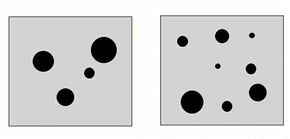Click here and press the right key for the next slide.
(This may not work on mobile or ipad. You can try using chrome or firefox, but even that may fail. Sorry.)
(If the slides don’t work, you can still use any direct links to recordings.)
also ...
Press the left key to go backwards (or swipe right)
Press n to toggle whether notes are shown (or add '?notes' to the url before the #)
Press m or double tap to slide thumbnails (menu)
Press ? at any time to show the keyboard shortcuts
Moral Intuitions and Heuristics: Initial Evaluation
moral vs mathematical intuitions
What do adult humans compute that enables their unreflective judgements to track mathematical attributes?
1. Mathematical attributes are inaccessible.
2. Unreflective mathematical judgements are (often enough) fast.
3. Computing inaccessible attributes is slow.
Therefore:
4. Making unreflective mathematical judgements does not involve computing mathematical attributes.

luminance?
What do adult humans compute that enables their unreflective judgements to track mathematical attributes?
1. Mathematical attributes are inaccessible.
2. Unreflective mathematical judgements are (often enough) fast.
3. Computing inaccessible attributes is slow.
Therefore:
4. Making unreflective mathematical judgements does not involve computing mathematical attributes.
also: compare linguistic intuitions
[1] He is a waffling fatberg of lies.
[2]* A waffling fatberg lies of he is.
Do moral intuitions rely on the affect heuristic?
theoretical arguments limited;
evidence needed
But what evidence could bear on the issue?